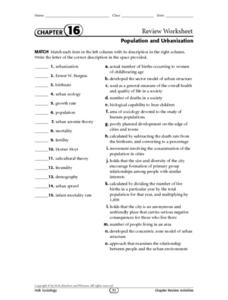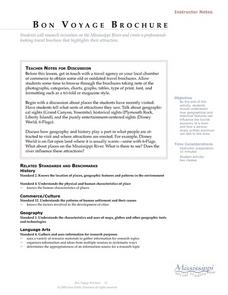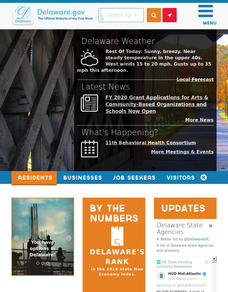Curated OER
Starting a Revolution
Students examine state quarters with images that refer to the Industrial Revolution. They discuss whether or not it is appropriate to commemorate that event. They research the Slater Mill and decide if it should be commemorated.
Curated OER
Population and Urbanization
In this population and urbanization worksheet, students match 15 terms with the appropriate descriptions and respond to 8 short answer questions regarding these sociological themes.
Curated OER
Global Warming
Students read information about global warming and make their own greenhouse. In this global warming lesson, students read several pages of global warming and climate information. Students then make their own greenhouse and answer...
Curated OER
The New Segregation
Students use census data to analyze the racial and economic diversity of their community. They discuss the role of diversity within communities and the impact that land use decisions can have on the composition of a community.
Curated OER
This Land is Your Land - Delaware
Students determine how land was divided and marked for boundaries in the early days of settlement in Delaware. Students mark out land on the playground according to the methods used by the early settlers. Students write a description of...
Curated OER
Design Your Own Biological Experiment
Young scholars work together to research a topic of interest to them. They form hypothesis and complete experiments testing them. They present their findings to the class.
Curated OER
Push/Pull factors in Immigration
Students explore the push/pull factors experienced by immigrant families. They interview a parent and an American about their family's immigration history. Students write a summary of the interview and compare the push/pull factors of...
Curated OER
Where Should We Put a Store?
Young scholars analyze population data. They convert population data into simple density maps to help make decisions about their world. They select the best location for a school store based on population density. They present their...
Curated OER
Fish Activities
In this fish activity worksheet, students learn a counting rhyme about fish. They then discuss the best way to care for fish and they learn 4 different types of fish. On the second page, students count lines of fish and color them a...
Curated OER
Climate and Cultures of Africa
Students gain an understanding of the relationship between climate and culture in the sub- Saharan Africa. Students will complete short exercises pertaining to the various cultures of Africa and the climate in which they live....
Curated OER
BE-01-01 Introduction to Business Ethics
Learners explore ethics. For this business ethics lesson, students watch "The Corporation" and discuss employee policies, community outreach, and business models. Learners consider various scenarios that encourage authentic...
Curated OER
What is Wind Chill?
Young scholars calculate wind chill using a mathematical formula. In this earth science lesson, students compare the wind chill in Antarctica to that of their local area. They explain how this can lead to hypothermia.
Curated OER
A Share in America
Students examine map - reflect on why English colonist kept coming to America (scarcity of land in England / seemingly endless land in America)
Recite line from English poem. They discuss English attitude towards Indians and their lands.
Curated OER
3-D Posters
Students work in small groups to create 3-D posters to discourage throwing trash away and encourage recycling.
Curated OER
Language Arts: Mississippi River Brochure
Young scholars create brochures about recreational activities along the Mississippi River. Focusing on points of interest, they research attractions and create maps of the surrounding area. Once students write descriptions of their...
Curated OER
Why Here? Why Not There?
Middle schoolers analyze a map and graph information on eleven countries. Using the characteristics of the countries, they determine if they should host the summer or winter Olympic games. After viewing a video, they locate the...
Curated OER
A Sense of West Virginia
Students consider their perceptions of the world through their 5 senses while visiting the West Virginia State Museum. In this West Virginia history lesson plan, students discover how knowing about the past helps with their understanding...
Curated OER
Land Use and Nitrogen
Students consider the effects of development on water quality. They test nitrogen levels in waters before and after development, investigate wastewater treatment options and research best management practices to reduce nitrogen loads.
Curated OER
The Abolitionist Movement
Eleventh graders examine a petition presented by the Quakers to the Delaware General Assembly in 1785 and an anti-slavery broadside published in 1836.
Curated OER
Mapping Your Local Community
First graders take a walking tour of their community to discover the names of numbered locations on a premade map. They then, create their own map of the community on the computer using Kidspiration software.
Curated OER
Water Quality Monitoring
Students comprehend the four parameters of water quality. They perform tests for salinity, dissolved oxygen, pH and clarity or turbidity. Students comprehend why scientists and environmental managers monitor water uality and aquatic...
Curated OER
Secrets of the Ocean Realm - In the School "Star Gardens"
Young scholars learn to use a tide table in plotting tidal curves and create a tide calendar by plotting a month-long tidal curve on an ordinary pictorial calendar.
Curated OER
Where Does the Water Go?
Students identify how the geography of the island of Maui influences the sources of water, identify/categorize the users of water on Maui after reading a series of news articles and construct a map of Maui displaying their findings.
Curated OER
What Have You Learned about the Mouth?
Students sequence the steps in a normal day that can lead to tooth decay and describe how to maintain a healthy mouth.

























